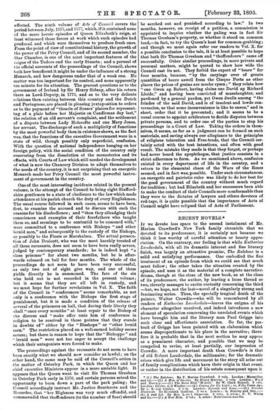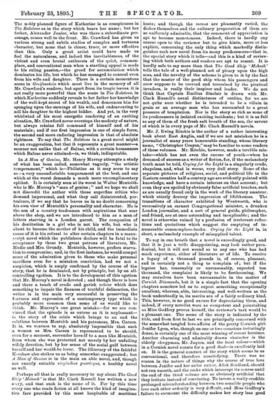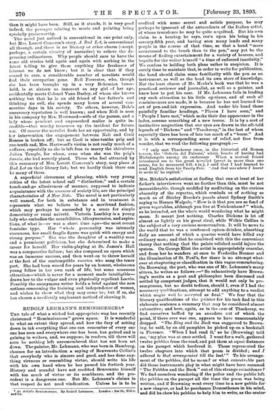RECENT NOVELS.* IF we devote less space to the second
instalment of Mr. Marion Crawford's New York family chronicle that we devoted to its predecessor, it is certainly not because we think it less worthy of careful attention or hearty appre- ciation. On the contrary, our feeling is that while Katherine Lauderdale, with all its dramatic interest and fine literary finish, was largely an attractive promise, The Ralstons is a solid and satisfying performance. One embodied the fine treatment of an episode from which we could see that much must follow ; the other takes the situation created by the episode, and uses it as the material of a complete narrative- drama, though at the close of the new book, as at the close of its predecessor, the author, by leaving a loose thread or two, cleverly manages to excite curiosity concerning the third —but, we hope, not the last—novel of a singularly strong and fascinating series. Thus, the specially tragical death of the painter, Walter Crowdie—who will be remembered by all readers of Katherine Lauderdale—leaves the enigma of his character altogether unsolved, and indeed introduces a new element of speculation concerning the unrelated events which have brought him and the literary man Paul Griggs into such close and affectionate association. So far, the por- trait of Griggs has been painted with an elaboration which seems disproportionate to his place in the narrative ; there. fore it is probable that in the next section he may appeat as a prominent character, and possible that we may be compelled to revise, at least partially, our impression of Crowdie. A more important death than Crowdie's is that of old Robert Lauderdale, the millionaire; for the dramatic crises which give life and movement to the story all arise out of family complications which have their origin in that event, or rather in the distribution of his estate consequent upon it
• (1) The Ralston.. By F. Marion Crawford. 2 vols. London : Macmillan and Co.—(2.) A Man of Genius. By Henry Murray. 2 vols. London : Wa,d and Donn'-y.---(3.) The Gaol Ship 4.3fsheek.' By W. Clark Russell. 2 .ols. Loudon: Ch sae no,d Windt's — (4.) Crying far Me Light; or, Fite Years Av. By L. E 'lug Bitehie. 3 v..ls. London: Jarrold and Sons.—(5.) Cornish Diamonds By El.zaheth Godfrey. 2 vo s. Londo.:: ll. Bentley and Son.— (6. A Bad Lot. By Mrs. L.,ve t Cameron. 3 vols. L udasi : F. V. White and C4.1.•—• (7. ) A New Note. 2 vols. L)ndon: Hutchinson and Co. The nobly planned figure of Katherine is as conspicuous in The Ralstons as in the story which bears her name ; but her father, Alexander Junior, who was there a subordinate per- sonage, comes well to the front. Mr. Crawford has given us various strong and subtle studies of complex and tortuous character, but none that is closer, truer, or more effective than this. Only a great artist could have made us feel the naturalness, and indeed the inevitableness, of the violent and even brutal outbursts of the quiet, common- place, and conventional man when a startling appeal is made to his ruling passion,—the greed for accumulation which dominates his life, but which he has managed to conceal even from his wife and daughter. There is a certain momentous scene in Greifen stein which must live in the memory of all Mr. Crawford's readers; but apart from its tragic issues, it is not really more powerful than the scene in The Rils tons, in which Katherine suddenly reveals to her father her knowledge of the well-kept secret of his wealth, and denounces him for sponging upon the earnings of his wife, and endeavouring to sell his daughter to the highest bidder. And yet, in the very whirlwind of his most energetic rendering of an exciting situation, Mr. Crawford never oversteps the modesty of nature, but always retains fall command of himself and of his materials ; and if our first impression is one of simple force, the second and more enduring impression is that of absolute rightness. To say that The Ralstons is a great novel might be an exaggeration, but that it represents a great manner—a manner not unlike that of Salzac, with a certain humanness which Balza° never attained—is, we think, indisputable.
In A Man of Genius, Mr. Henry Murray attempts a study of what has been called, somewhat vaguely, "the artistic temperament," which is—Philistine as it may seem to say so—a very uncomfortable temperament at the best, and one which at the worst demands a much more uncomplimentary epithet. It is certainly seen at its worst in Walter Menteith, who is Mr. Murray's "man of genius ; " and we hope we shall not discredit the author with those superfine critics who demand impersonal, and what they call disinterested, por- traiture, if we say that he leaves us in no doubt concerning his own view of Menteith's personality and character. He is the son of a country tradesman with aspirations that soar above the shop, and we are introduced to him as a man of letters starving in a London garret. The companion of his destitution is a girl who is not his wife, but who is about to become the mother of his child, and the immediate cause of it is his refusal to alter certain chapters in a manu- script novel which the publishers declare will be fatal to its acceptance by those two great patrons of literature, Mr. Mudie and Mrs. Grundy. Menteith, however, prefers starva- tion to compromise; and, in the first instance, he would compel some of the admiration given to those who make personal sacrifices even for a mistaken conviction, had we not a suspicion, which is amply confirmed by the course of the story, that he is dominated, not by principle, but by an all. controlling egotism. It is to the development of this egotism that Mr. Murray's novel is devoted ; and though there is here and there a touch of crude and garish colour which does something to impair the fineness of truthful delineation, the writer is in the main very successful in preserving the features and expression of a contemporary type which is probably more common than some of us would like to think. Mr. Murray's one great mistake—for we are con- vinced that the episode is as untrue as it is unpleasant— is the story of the crisis which brings to an end the relations between Menteith and his patroness, Mrs. Carson. It is, we venture to say, absolutely impossible that such a woman as Mrs. Carson is represented to be should, even for a moment, surrender herself to a man like Menteith, from whom she was protected not merely by her unfailing wifely devotion, but by her sense of the social gulf between herself and her would-be lover. The illiteracy of the faithful Kershaw also strikes us as being somewhat exaggerated; bat A Man of Genius is in the main an able novel, and, though not exactly suitable virginibus puerigue, a healthy novel as well.
Perhaps all that is really necessary to say about The Good Ship 'Mo/sock' is that Mr. Clark Russell has written a new s'ory, and that such is the name of it. For by this time every one who reads fiction at all knows the kind of imagina- tive fare provided by this most hospitable of maritime hosts; and though the menus are pleasantly varied, the dishes themselves and the culinary preparation of them are so uniformly admirable, that the comment of appreciation is apt to become monotonous. Indeed, there is hardly any course open to the reviewer but to give hints, more or less explicit, concerning the only thing which markedly distin- guishes each new novel from its many predecessors—that is, the special story which it tells—and this is a kind of review- ing which both authors and readers are apt to resent. It is hardly safe to say more than that The Good Ship lifohock' tells the tale of a well-planned act of piracy upon the high seas, and the novelty of the scheme is given to it by the fact that the master of the good ship whom his passengers and crew suppose to be coerced and terrorised by the piratical invaders, is really their inspirer and leader. We do not think that Captain Emilius Sinclair is drawn with Mr. Clark Russell's usual distinctness of outline, for we are not quite sure whether he is intended to be a villain in grain or an average man who has succumbed to a great pressure of temptation. Nor is the story so rich as some of its predecessors in isolated exciting incidents ; but it is as full as any of them of the fresh salt breath of the sea, the savour of which is in every page of Mr. Clark Russell's novels.
Mr. J. Ewing Ritchie is the author of a rather interesting book about East Anglia, and if we are not mistaken he is a journalist of many years honourable standing, whose literary name, "Christopher Crayon," may be familiar to some readers of these volumes. Mr. Ritchie, however, made a terrible mis- take—which has not even the excuse of youth—when he dreamed of success as a writer of fiction, for, if the melancholy truth must be told, Crying for the Light is a singularly crude, shapeless, and, what is worse, very dull story. Some of the separate pictures of religious, social, and political life in the Eastern counties half-a-century ago are evidently painted with knowledge, and have a certain interest on that account ; but even they are spoiled by obviously false artificial touches, such as are usually found only in the work of the literary amateur, which utterly destroy the impression of lifelikeness. The transitions of character exhibited by Wentworth, who is successively an earnest Congregational minister, a drunken London journalist, and a sort of general guide, philosopher, and friend, are at once astounding and inexplicable ; and the novel is otherwise ruined by a profusion of irrelevant reflec- tions and quotations which suggest the emptying of in- numerable commonplace-books. Crying for the Light is, in short, a melancholy example of misapplied talent.
To say in one breath that a novel is exceedingly good, and that it is jest a trills disappointing, may look rather para- doxical, but it will not sound so to any one who has had much experience, either of literature or of life. To receive a legacy of a thousand pounds is, of course, pleasant, and is certainly not a thing to complain of ; but if the legatee has, reasonably or unreasonably, expected ten thousand, the complaint is likely to be forthcoming. We may ourselves have been unreasonable in the matter of Cornish Diamonds, but it is a simple fact that the opening chapters somehow led us to expect something exceptionally excellent, whereas, able, interesting, and well-written as the book undoubtedly is, its merits are of a fairly ordinary kind. This, however, is no good excuse for depreciating them, and indeed, if every novelist were as competent and painstaking as Miss Godfrey proves herself, the reviewer's task would be a pleasant one. The scene of the story is indicated by the title, and from first to last we are principally concerned with the somewhat tangled love-affairs of the pretty Cornish girl, Jenifer Lyon, who, though on one or two occasions irritatingly dense, is certainly one of the most winning of recent heroines. Another charming and admirably drawn character is the elderly clergyman, Mr. Jaques, and the local colour—which in a Cornish novel counts for a good deal—is excellently laid on. It is the general conduct of the story which seems to U8 conventional, and therefore unsathfying. There was no reason in the nature of things why the course of true love between Jenifer and her sailor suitor, Alick Studland, should not run smooth, and the rocks which interrupt its course until the end of the third volume are so obviously artificial that they irritate instead of convincing. To invent a really credible prolonged misunderstanding between two sensible people who love each other ardently is very d•flicalt, and Miss Godfrey's failure to surmount the difficulty makes her story less good
than it might have been. Still, as it stands, it is very good indeed, the passages relating to music and painting being specially praiseworthy.
The novel just noticed is conventional in one point only, but Mrs. Lovett Cameron's story, A Bad Lot, is conventional all through. and there is no literary or other charm (except, perhaps, a certain vivacity of narrative) to relieve the de- pressing ordinariness. Why people should care to have the same old stories told again and again with nothing in the latest telling to give them anything like freshness of interest we do not know ; but it is clear that if they ceased to care, a considerable number of novelists would find their occupation gone. Nell Forrester, who, though she has been brought up in a very Bohemian house- hold, is at sixteen as innocent as any girl of her age, accidentally meets Colonel Vane Darley, of whom she tnows nothing but that he is an old friend of her father's, and thinking no evil, she spends many hours of several con- secutive days in his society. To others, however, Dale's unsavoury reputation is well known ; and when Nell is seen in his company by Mrs. Hartwood—wife of the parson, and a la3y whose prurient and unprovoked malice is quite in- credible—that worthy treasures up the incident for future use. Of course the novelist finds her an opportunity, and by her interventicn the engagement between Nell and Cecil Roscoe is broken off ; but as Cecil is nine-tenths prig and one-tenth cad, Mrs. Hartwood's victim is not really much of a sufferer, especially as she is left free to marry the chivalrous Julian Temple, for whom, even when she was the prig's fiancée, she had secretly pined. Those who feel attracted by this summary of Mrs. Lovett Cameron's story, may place A Bad Lot on their library list; but we hardly think there can be many of them.
A superficial cleverness of phrasing, which very young critics of the latest school call "distinction," and a certain touch-and-go allusiveness of manner, supposed to indicate acquaintance with the nuances of society life, are the principal characteristics of A New Note. The novel is not particularly well named, for both in substance and in treatment it represents what we believe to be a moribund fashion, which may perhaps be succeeded by a craze for simple domesticity or rural naiveté. Victoria Leathley is a young lady who embodies the sensibilities, idiosyncrasies, and aspira- tions, of what is—or was a short time ago—the most recent feminine type. Her "whole personality was intensely strenuous, her small fragile figure was quick with energy and strong purpose." She was the daughter of a wealthy man and a prominent politician, but she determined to make a career for herself. Her violin-playing at St. James's Hall was a comparative failure ; but she composed an opera which was an immense success, and then went on to throw herself at the feet of the contemptible vaurien who sang the tenor part. She had been wooed for years by an honest, wholesome young fellow in her own rank of life, but some sensuous attraction—which is never for a moment made intelligible— draws her to the vulgar and even physically repellent Loevio. Possibly the anonymous writer holds a brief against the new notions concerning the training and independence of women, and wishes to show what they may come to; but if so, she has chosen a needlessly unpleasant method of showing it.




































 Previous page
Previous page